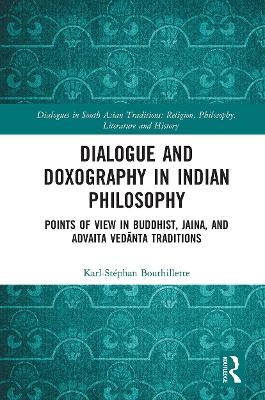
Dialogue and Doxography in Indian Philosophy
Points of View in Buddhist, Jaina, and Advaita Vedānta Traditions
Seiten
2021
Routledge (Verlag)
978-1-032-23763-3 (ISBN)
Routledge (Verlag)
978-1-032-23763-3 (ISBN)
This is the first book fully dedicated to Indian philosophical doxography. It looks at Indian doxography both as a witness of inter and intra sectarian dialogues, and as a religious phenomenon.
This is the first book fully dedicated to Indian philosophical doxography. It examines the function such dialectical texts were intended to serve in the intellectual and religious life of their public. It looks at Indian doxography both as a witness of inter- and intra-sectarian dialogues and as a religious phenomenon. It argues that doxographies represent dialectical exercises, indicative of a peculiar religious attitude to plurality, and locate these ‘exercises’ within a known form of ‘yoga’ dedicated to the cultivation of ‘knowledge’ or ‘gnosis’ (jñana).
Concretely, the book presents a critical examination of three Sanskrit doxographies: the Madhyamakah¿dayakarika of the Buddhist Bhaviveka, the ¿a¿darsanasamuccaya of the Jain Haribhadra, and the Sarvasiddhantasa¿graha attributed to the Advaitin Sa¿kara, focusing on each of their respective presentation of the Mima¿sa view.
It is the first time that the genre of doxography is considered beyond its literary format to ponder its performative dimension, as a spiritual exercise. Theoretically broad, the book reaches out to academics in religious studies, Indian philosophy, Indology, and classical studies.
This is the first book fully dedicated to Indian philosophical doxography. It examines the function such dialectical texts were intended to serve in the intellectual and religious life of their public. It looks at Indian doxography both as a witness of inter- and intra-sectarian dialogues and as a religious phenomenon. It argues that doxographies represent dialectical exercises, indicative of a peculiar religious attitude to plurality, and locate these ‘exercises’ within a known form of ‘yoga’ dedicated to the cultivation of ‘knowledge’ or ‘gnosis’ (jñana).
Concretely, the book presents a critical examination of three Sanskrit doxographies: the Madhyamakah¿dayakarika of the Buddhist Bhaviveka, the ¿a¿darsanasamuccaya of the Jain Haribhadra, and the Sarvasiddhantasa¿graha attributed to the Advaitin Sa¿kara, focusing on each of their respective presentation of the Mima¿sa view.
It is the first time that the genre of doxography is considered beyond its literary format to ponder its performative dimension, as a spiritual exercise. Theoretically broad, the book reaches out to academics in religious studies, Indian philosophy, Indology, and classical studies.
Karl-Stéphan Bouthillette is currently an FWO post-doctoral researcher in Ghent, Belgium. He received his PhD at the Institute for Indology and Tibetology at Ludwig-Maximilians-University, Germany.
Acknowledgements;
Preface;
Introduction;
1 The beginnings of Madhyamika doxography: Bhaviveka’s MHK;
2 The beginnings of Jaina doxography: Haribhadra’s ¿DS;
3 The beginnings of Advaita doxography: Sa¿kara’s SSS;
Conclusion;
Bibliography;
Index
| Erscheinungsdatum | 14.12.2021 |
|---|---|
| Reihe/Serie | Dialogues in South Asian Traditions: Religion, Philosophy, Literature and History |
| Zusatzinfo | 10 Illustrations, black and white |
| Verlagsort | London |
| Sprache | englisch |
| Maße | 156 x 234 mm |
| Gewicht | 326 g |
| Themenwelt | Geschichte ► Allgemeine Geschichte ► Altertum / Antike |
| Geisteswissenschaften ► Philosophie ► Östliche Philosophie | |
| Geisteswissenschaften ► Religion / Theologie ► Buddhismus | |
| Naturwissenschaften ► Geowissenschaften ► Geografie / Kartografie | |
| ISBN-10 | 1-032-23763-5 / 1032237635 |
| ISBN-13 | 978-1-032-23763-3 / 9781032237633 |
| Zustand | Neuware |
| Informationen gemäß Produktsicherheitsverordnung (GPSR) | |
| Haben Sie eine Frage zum Produkt? |
Mehr entdecken
aus dem Bereich
aus dem Bereich


